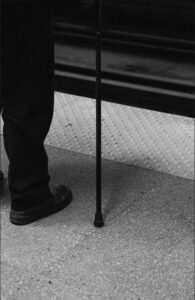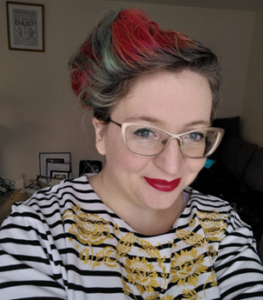Blog by Emma Sheppard
There is a lot in media about Long Covid—and in particular about the big concerns about how living with Long Covid must be awful. This fear of Long Covid is shaped by ableism, but that same ableism—and how we talk about Long Covid—impacts people already living with chronic illnesses that have a lot in common with Long Covid.
 Concerns about Long Covid and quality of life boil down to a fear that living with a chronic illness is awful. And it is; I am in no way dismissing the awfulness of chronic illness, and experiences of fatigue, exhaustion, pain, or nausea. As someone living with a chronic illness myself, I know how awful it can be. However, chronic illness is not awful just because of chronic illness. What makes chronic illness awful is also ableism.
Concerns about Long Covid and quality of life boil down to a fear that living with a chronic illness is awful. And it is; I am in no way dismissing the awfulness of chronic illness, and experiences of fatigue, exhaustion, pain, or nausea. As someone living with a chronic illness myself, I know how awful it can be. However, chronic illness is not awful just because of chronic illness. What makes chronic illness awful is also ableism.
Ableism here means we have particular assumptions and expectations about how bodyminds* work. (socioculturally speaking—different cultures might express or respond to this differently; my research is UK-based, as is my own lived experience), and what it means to be ill, disabled, and/or in pain. Firstly, we assume that being “healthy” is the default position, and also the most desirable—so we assume that someone is healthy unless told otherwise. Then, we assume that when someone is not healthy, they want to become healthy, that they are actively looking for a cure, or be rehabilitated, to be as close to non-disabled and/or healthy as they can get (Patsavas 2014; Sheppard 2020). This is also seen with how we approach fatness; we assume that fat people want to be thin, because we assume that being fat is unhealthy. Health—or the appearance of what we assume is health—is valued.
Secondly, we assume that when someone is unhealthy (or disabled) that this is a temporary state (Wendell 2001). This in part reflects the assumption that ill people are looking to be cured, but this means that we don’t really have much of a frame of reference to understand long-term illness. We can sort of cope with the idea of someone being ill for weeks, or even a few months, but when you start to look at being ill for years—even the rest of a person’s life—with a chronic illness such those like as Long Covid could turn out to be, we really struggle to understand that.
These two effects of ableism (we value health/non-disabledness, and that we don’t know how to imagine long-term illness) means the world isn’t set up for chronically ill people. The experience of finding the world isn’t set up for you anymore (or not set up for you in ways that are new to you) is difficult and emotional, and made much, much harder because you are also dealing with changes, which we often experience as loss—loss of ability (in that you can no longer do things you used to be able to do), future plans or dreams, and of social status and social relations that themselves come from those other changes.
We may also lose friends—and social status—because of people’s attitudes toward chronically ill/disabled people. Because they don’t have a frame of reference for chronic illness—and illness/disability is regarded as tragic—people who aren’t chronically ill aren’t entirely sure what to do with us, which is scary and uncomfortable for them. Ableism also means that this is our fault—because we don’t fit the desirable/default norms.
Ableism can also affect relationships with doctors and medical caregivers. However, in cases where the exact mechanism of chronic illness is unclear and/or there is no known way of curing the illness, this can be difficult for the doctor to deal with. It goes against the ableist assumption that illness is only ever short-lived—and the doctor’s own assumption that they will be able to cure their patient. It can show up as chronically ill people being seen as “not really” ill, as malingering or “doing it for attention”—and we’ve already seen these attitudes from doctors about Long Covid.
For people who are newly chronically ill, dealing with this comes on top of being ill. This is a lot, and it is awful—and through internalized ableism we blame ourselves for being ill, for “failing” to get better. We are learning to adapt to a new way of living with no frame of reference (Sheppard 2018; 2020). For people who have been chronically ill, we may adapt—learn to live with the idea that we may never get better (twelve years in, I have not stopped hoping—or fearing I may one day get worse)—but the dismissal and the fear from others never stops hurting us.
What little others do know about living with chronic illness paints our lives as awful. They’re frightened of becoming like that—of becoming chronically ill or disabled (Hughes 2012; Patsavas 2014; Sheppard 2018). With Long Covid, they are frightened not just of becoming ill and staying ill—they are frightened of losing their status as “normal.” And they express that fright by saying how horrible and terrible it must be to become ill. And that feels really horrible when you are that person already.
Being told that people fear becoming like you—that your life is frightening (and sometimes even being told that death would be preferrable to becoming like you)—is awful, especially when people don’t consider whether there is anything they could change.
*bodyminds—rather than thinking body-and-mind, we think about how we can’t really separate the two (and thinking of them as one is more useful!) especially when it comes to chronic illness and disability.
References
Hughes, B., 2012. Civilising modernity and the ontological invalidation of disabled people. In Disability and social theory (pp. 17-32). Palgrave Macmillan, London. https://doi.org/10.1057/9781137023001_2
Patsavas, A., 2014. Recovering a cripistemology of pain. Journal of Literary & Cultural Disability Studies, 8(2). pp.203-219. http://doi.org/10.3828/jlcds.2014.16
Sheppard, E., 2018. Using pain, living with pain. Feminist Review, 120(1), pp.54-69. https://doi.org/10.1057/s41305-018-0142-7
Sheppard, E., 2020. Performing normal but becoming crip: living with chronic pain. Scandinavian Journal of Disability Research, 22(1). http://doi.org/10.16993/sjdr.619
Wendell, S., 2001. Unhealthy disabled: Treating chronic illnesses as disabilities. Hypatia, 16(4), pp.17-33. https://doi.org/10.1111/j.1527-2001.2001.tb00751.x
 Emma is a lecturer in Sociology at Coventry University. Her research explores lived experience of chronic pain and fatigue and the concept of crip time.
Emma is a lecturer in Sociology at Coventry University. Her research explores lived experience of chronic pain and fatigue and the concept of crip time.